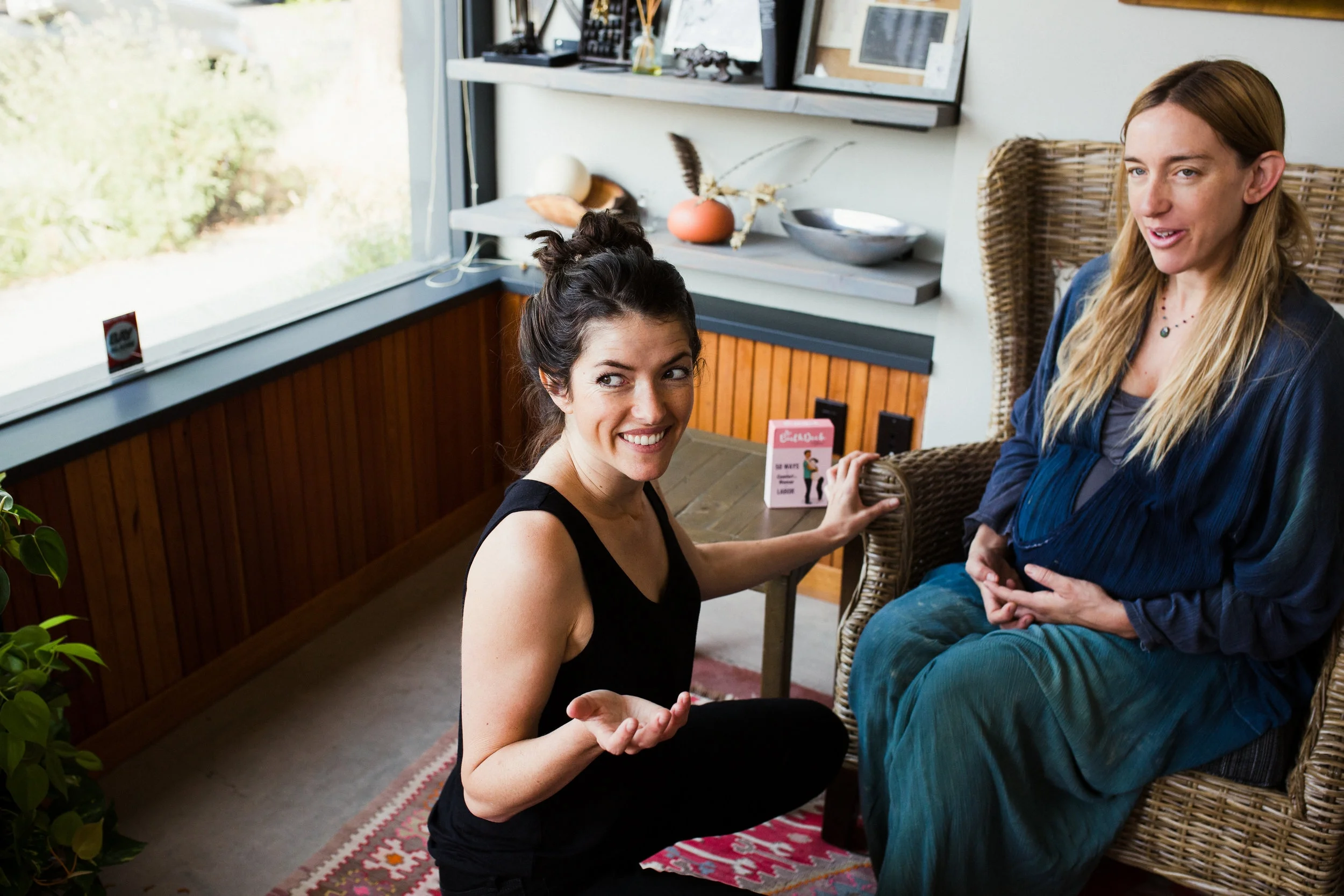Leopi, what do we need to know about the postpartum period that will help us understand the libido after baby?
Perhaps the most important thing to learn about postpartum sex is the role hormones continue to play in the postpartum physical experience. The breastfeeding hormone prolactin will reduce a woman’s libido, and even make her mucosal membranes dryer, including her vagina, which makes sex uncomfortable without adding lubrication.
For people who are highly sexual, the shift can be quite a shock, but know that it’s normal! It’s very rare that someone is highly sexual when they are postpartum and breastfeeding. The shift is so dramatic that it can be scary for a woman if she really identified with her sexuality prior to pregnancy. She can feel really lost without that natural desire. She can feel numb.
How does this new physical reality impact the relationship dynamic?
It’s so important that both partners are totally aware of the hormone shift involved with breastfeeding, and the physical impact of those hormones. Don’t feel threatened by these changes, or insecure, it’s a necessary process that will change again when breastfeeding ends.
Partners often feel like the new mama doesn’t love them as much as before she gave birth, and that she’s spending all her time with the baby. Meanwhile, the mother starts to feel unsure of herself because she’s always rejecting her partner since she doesn’t feel affectionate or sexual. The hardest part of the postpartum process is not knowing how to talk about all the changes in the core relationship, how to express these emotional and physical feelings.
Your doctor will almost always say that after six weeks, or sooner, you can resume sex if you’re not bleeding. That’s the typical expectation: at six weeks we’re going to get back to it! I’m going to have my body back and we’re going to be so in love, and now our little baby is here! But this high expectation that there’s going to be normal sex happening again soon after birth, especially on the part of the person who didn’t birth the baby, is often met with disappointment. Lo and behold, most people get to six weeks, and sex is just not happening the way they anticipated.
For the mother there is a sense that the six week healing “deadline” is approaching, and she’s like, “oh my gosh, we’re going to start having SEX?! I’m not ready!” Her body is being held onto and touched constantly by the baby. She’s tired, but it’s also the prolactin hormone that’s driving her brain and body to be focused on this little baby, and not her own desires or the desires of her partner. From another perspective, the perspective of evolution, it’s actually kind of perfect!
Both parents are going to be exhausted, and the partner also might not always feel like being sexual. Heterosexual couples live with the reality that the male partner has testosterone and still has a sex drive, that didn’t go away with the birth of their baby. So, here we have two partners, one with testosterone who is desiring sex, and one with prolactin who does not desire sex- it’s not a personal thing, it’s very important to understand that it’s purely hormonal. This does not exclude same-sex couples from a similar conundrum: one partner does not have prolactin, and is desiring affection and sex, while the other does have prolactin, and isn’t in the mood.
Most mothers are feeling more love than ever for their partners after birth, they’ve just had this child together. She’s hopefully feeling safe and protected by her partner, even though there are totally new dimensions of each other that they’ve never experienced before. This newness in the dynamics of the relationship can be really tricky to navigate.
The mother is so tremendously devoted to the new baby, and the partner can easily become threatened by this bond that is growing outside of his relationship with the mother. It can be disorienting, both emotionally and physically, due to exhaustion. Hard nights and tough feelings can mean that sometimes a couple just needs to look away from each other for a time, and go through their huge growth curve as human beings; there is a lot happening for each of them.
How can couples work together to maintain intimacy during the postpartum phase?
Women need to stay connected to their sexual selves. Enjoy your beautiful body that’s just given birth, your full breasts that aren’t sexual for the time being, but they are feminine and life-giving. Let your romantic and sensual understanding of what you’ve just achieved with your body take the place of sexual desire. I remember feeling extremely romantic and sexy, I just did not feel sexual, and that’s a big distinction.
It’s important for her partner to look at her, not just at what she’s doing, like a cow milking all day. She needs to feel attractive to her partner. Her partner is responsible for continually reminding her how beautiful she is with words and welcome touch that can be sensual rather than sexual, like kisses on her neck, or pulling her in close for a meaningful kiss, things that make her feel desired as a woman, not a caregiver.
It’s hard work being touched all day by a little being, and sometimes a partner’s touch isn’t the thing that will bring her back into her own body. Sometimes it’s some form of body therapy like massage where there is no reciprocity expected, where you can just go within, de-stress and fine tune, and listen to the details of what you need, and then you feel sexier. Also, having really high quality, delicious, medicinal food and eating enough every day is great for the libido.
Maybe most importantly, both partners need to have some explicit agreements in the new paradigm of postpartum sexuality. For instance, “We will be sexual and affectionate regularly without the expectation of sex every time we reach out.” It’s OK for the mother to stipulate, “I just want to be held by you, but that doesn’t mean that you’re going to try moving this into sex every time, because then I’m going to stop reaching out to you. I don’t want to reject you, I hate having to reject you.”
This typical approach-rejection back and forth around postpartum sex sets up a terrible dynamic of isolation from one another. It’s so sad to see this happen, derived solely from the confusing postpartum hormones and exhaustion. It’s so much easier to avoid the isolation if there is open discussion of what’s going to happen postpartum, and agreements made about behavior and communication before it’s an issue.
These agreements can include something like a cue: “When I really want sex, I’m going to give you this sign, and then you’ll know that we’re in that zone.” Which I know sounds silly, but the closeness and the sensuality and the affection and the friendship and the humor are so much sexier than sex to a woman in the first 3-5 months. When a partner changes diapers, makes dinner, wakes up early with the baby so mom can sleep, when he washes the dishes and puts everything away and makes the kitchen beautiful, these are things that are sexy to a woman in this phase.
I know that sounds really dumb, and housewifey, but it actually makes a lot of sense! She needs to feel taken care of, she doesn’t need to feel like just a big mama, always bossing people around or organizing people. And she definitely doesn’t want to be a nag; that feels so unsexy. She wants to feel like she’s being heard and that she’s really respected and appreciated for the hard work that she does all day and all night with her baby, that’s really sexy.
The body does change postpartum, particularly with the breastfeeding hormones. It’s fair to assume that the first few times will be a little awkward, because mom’s like, “Whoa! I can’t believe I had a baby through my vagina!” So let’s assume the first 3-6 weeks you can enjoy sexy touching, kissing and foreplay. This type of sensual interaction can be really lovely for a women who has just give birth and wants to feel like her partner really wants her, really loves her and her body.
When it’s safe to have intercourse, which is usually around 6-8 weeks depending on the birth, mama will be dry due to the prolactin hormone. Use a lot of lube! Many women think it’s because they had stitches, or are damaged from the birth, but this is rarely the case. Often it starts as real fear, then the awkwardness around sex sets in through the repeated attempt and rejection, then it becomes a kind of excuse: “It hurts too much, I can’t do it”, when really it’s just uncomfortable interpersonally more than anything.
Once you start actually having sex, you’re going to realize how good it is for your own body and mind, and for your relationship. At first many women resist sex because it’s really confronting. It’s hard to commit to working with your new body, and with your partner, to overcome what feels like an insurmountable task: rebuilding your sexuality after birth. As a postpartum mom, frankly, it’s such a beautiful, compassionate gift to give your partner sex and in a loving way, because they need it! They really do! If you are able to give your partner sex with joy and lovingness, you will probably end up realizing how much you needed it too.
Do you have any do’s and don’ts for this sensitive time?
DON’T GO FOR THE BREASTS. Just don’t go for the breasts. That is such a turn off for nearly all postpartum moms. Their breasts are being touched and sucked all day, in a non-sexual way, and that’s what they exist for in this time and space. But of course, they’re so beautiful and round and full, they’re very attractive, of course the partner wants to enjoy them! But no, just don’t. So, where can the partner touch a new mother’s body? Down the spine, the butt, the legs, anywhere the baby hasn’t been touching all day. Rediscover erotic zones besides the breasts and vagina.
DON’T COMPARE PRE-KIDS SEX TO POST-KIDS SEX. Before, there was time, you could just linger. But now, you might just have a quickie, or some foreplay, and then get interrupted by the baby or the kids, and then get into it again later. Sometimes you get into it just enough to get turned on, and then you just have to enjoy that feeling until you can get back into it, and that’s ok! Even if you were turned on and you guys didn’t have your orgasms, it’s so deeply beneficial to turn up that sexual dial again. It’s a great beginning!
BE FLUID AND HAVE A SENSE OF HUMOR. Laugh about how long or short the sexual interaction is, or when you’re interrupted by the baby crying, or when your milk starts leaking mid-sex. This postpartum phase is precisely why I suggest working on your communication early, before birth, so you can flow through this new territory comfortably, because it’s tricky!
EXPRESS YOURSELF. I can’t tell you how many of my mom clients have told me that they are so sick of their partners wanting sex when they’re just exhausted; maybe they’ve been up with the baby all night, it’s 11 am and she hasn’t even gotten any breakfast yet, and her partner is awake and has some free energy and wants to have sex. Resentment easily builds when these two people are living in such different worlds together. The mother needs to feel comfortable explaining her needs instead of repressing it all, hiding her feelings, and possibly becoming depressed.
How do you commonly see couples sabotaging their sex lives after kids?
Physicality, whether it’s sensual, sexual or affectionate, is necessary for both parents’ health and wellbeing. I’ve seen modern parenting evolve so that the baby is getting all of the affectionate love, leaving little between the couple, and this is unbalanced. Parents can sabotage their sexuality and their relationship by over-parenting.
We all read so many books about parenting, but how many books do we read about healthy sexuality or a happy marriage? It’s all about being this ultra-perfect mother and father, and that’s really what we become, this ultra-mother and ultra-father. In this process, we lose a little bit of our identities with the parts that we were initially attracted to.
Be mindful when you are choosing your parenting philosophy; are you making room for your primary relationship? Attachment parenting, the family bed, prolonged breastfeeding, these are great philosophies in theory and sometimes in practice. But, a couple really needs to be educated on the postpartum hormones and make informed decisions about their parenting style with a full understanding of how it may impact their relationship. I actually think that in a lot of ways, the relationship is the primary concern, and the baby secondary, because the baby really needs the couple to be happy and connected and in love and close to one another.
So, really assess what you need as a couple to foster your intimacy. Do you need to get the baby to bed by 7:30 so you can have evenings together for adult conversation? Are you able to sleep in the same bed even with the pressures of night-feeding? Can you make it a goal to be in bed together, touching one another, not with pajamas on but skin-to-skin?
It’s OK to have boundaries with your parenting and with your children in a loving way. It’s a wonderful thing for a child to see that their parents’ relationship is important; there should be no guilt about that. It’s so positive for the child to see that the parents matter as much to each other as the child matters to them.
There is so much guilt around parenting right now: the pressure of perfectionism, all the books, the intellectual inundation. My blanket advice is to be in your body and in your heart. Say “no” when you want to say “no”, you don’t always have to explain everything. If you’re an affectionate, loving mother, then you can say “no” at any time without any guilt.
Leopi, you are the sexiest woman I’ve ever met, please tell us your sexy ways; we need your help!
I’ve always loved to decorate myself in some way, I love to take care of my body, to be in my body. I love being sensual and having beauty around me. I indulge in creating a peaceful space filled with symbols of beauty that help my heart and soul.
I love giving myself treats like body care therapies and occasional nice meals out. I actually love taking myself out to dinner and being served, especially when my kids were younger. I love to sit in a beautiful restaurant, daydream, eat slowly, and observe people.
I suggest you also indulge yourself when eating at home. Have your treats, a little pot or wine or a mixed drink, of course not too much. We need to have our treats, we are women, we need to enjoy relaxing. Eating your chocolates, along with your healthy diet.
Lingerie! I come and go with that, but after birth, and especially while nursing, having some lingerie that’s fit perfectly to your new body, even if it’s under your clothes and you don’t show it to anyone, it’s a beautiful feeling.
Decorate yourself! Wear some beautiful earrings, get your nails done, fine-tune the things you enjoy and treat yourself. I like having liquid eyeliner on, lotions and oils on my skin.
Nurture your relationships with adults other than your partner. Invest in a variety of relationships that reflect all of your essential things in life.
MEET LEOPI SANDERSON-EDMUNDS
Leopi has been a licensed home-birth midwife since 1985, supervising and caring for over 1300 families. In addition to her midwifery practice, she offers care for prenatal and non-natal clients through orthobionomy, a slow and beautiful form of bodywork focusing on bone and soft tissue alignment. Unique in her field, Leopi offers prenatal counseling for women and couples to reach a deeper experience of pregnancy, and birth, no matter where and with whom they are birthing. Leopi also has a BA in Art Therapy and creates phenomenal masterpieces of figure painting. Leopi can be reached via the web at Sanctuary Leopi.























